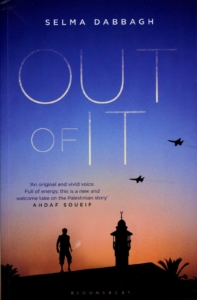It would defy me to talk about Palestine without being overtly political, and maybe that’s why Selma Dabbagh doesn’t even try to avoid politics in Out of It. Out of It is political in the sense that all novels can be conceived of as arising from and being shaped by their historical context, but it’s also, very literally, about politics. The primary characters spend their lives worrying about Palestine’s fragile material existence; they approach internal and external threats as tangible and political, not existential. Because of this focus, the plot of Out of It is predictable and topical, but it’s also a relevant dialogue between two opposing approaches to living in an inescapably political environment.
Westernized siblings Rashid and Iman spend the novel in their homeland Palestine and in England, and react in opposite ways to their same reality, which is that the Palestinian conflict guides and confines their lives, both physically and psychologically, wherever they are. Rashid has lost faith in the possibility of an end to the conflict, so he smokes pot and has a chip on his shoulder, mostly. Iman witnesses a horrific bombing and then militarizes, idolizing a glamorously tragic leader in a prominent political party. Both siblings are in their twenties, which means that they spend a significant portion of the book bickering and swooning and generally hassling each other and the people around them.
If my description of the main characters is flippant, it’s partly because Rashid and Iman typify tired and tiring antonymic stereotypes. It’s like a medieval allegorical drama: Apathy and Activism, dueling through soliloquy. The plot twists just enough for the novel to constitute a narrative. Overwrought writing doesn’t help Out of It, given Dabbagh’s tendency to include nonsensical personification and metaphor:
He looked with her across the lawn that was paneled with muted green and whitish shade as the sunlight pushed through the clouds and the trees to hit in shafts. There was something of a cross-dresser about the house, the sloppy thatch flopped like a lady’s hat and the climbing roses were like rouge on its builder’s jaw of brick structure.
Despite this, there’s some life in Out of It. The characters are painfully human, even in their flatness; our stubborn faith defines us as surely as our nuances. There are moments, too, that are comic and homey in the British style, a familial voice echoing Zadie Smith even while acutely aware of Sahar Khalifeh. As in Smith’s White Teeth, Dabbagh allows us to observe a witty caricature of the cultural tension between the traditional, stodgy Englishman and foreign arrivals to the United Kingdom. Here, the tension also exposes clichés of colonial yearning and a romanticism of the Orient, which Dabbagh captures in a scene when Rashid visits his British girlfriend’s home:
Lisa, however, seemed to be very pleased with how he looked in her parents’ house. It was as though she had brought home a particularly gaudy piece of jewelry from a junk shop and could now, against a plain background, appreciate its particular panache.
It’s enough that I continued: exasperated, but involved.
Rashid and Iman attempt to understand their responsibilities (or lack thereof) to their community as young Palestinians; although it is the particular setting of Out of It that urges the plot onwards, Rashid and Iman’s struggle is still a catholic, recognizable quest. Dabbagh’s efforts to reveal the individual dramas concealed in a consuming conflict remind me that most stories are about individuals caught in the politics of their surroundings — it’s just more obvious when it’s about Palestine.
This post may contain affiliate links.









